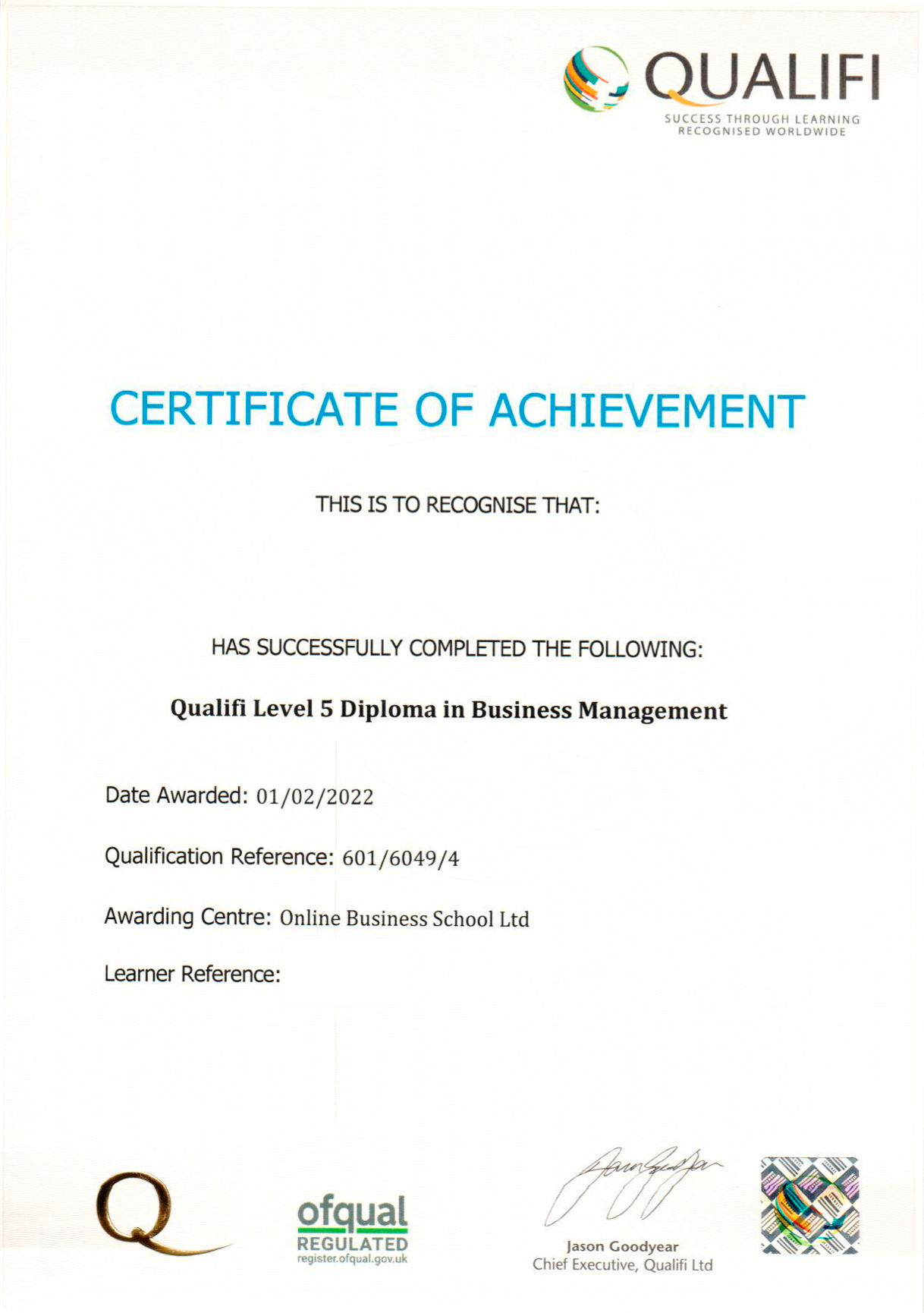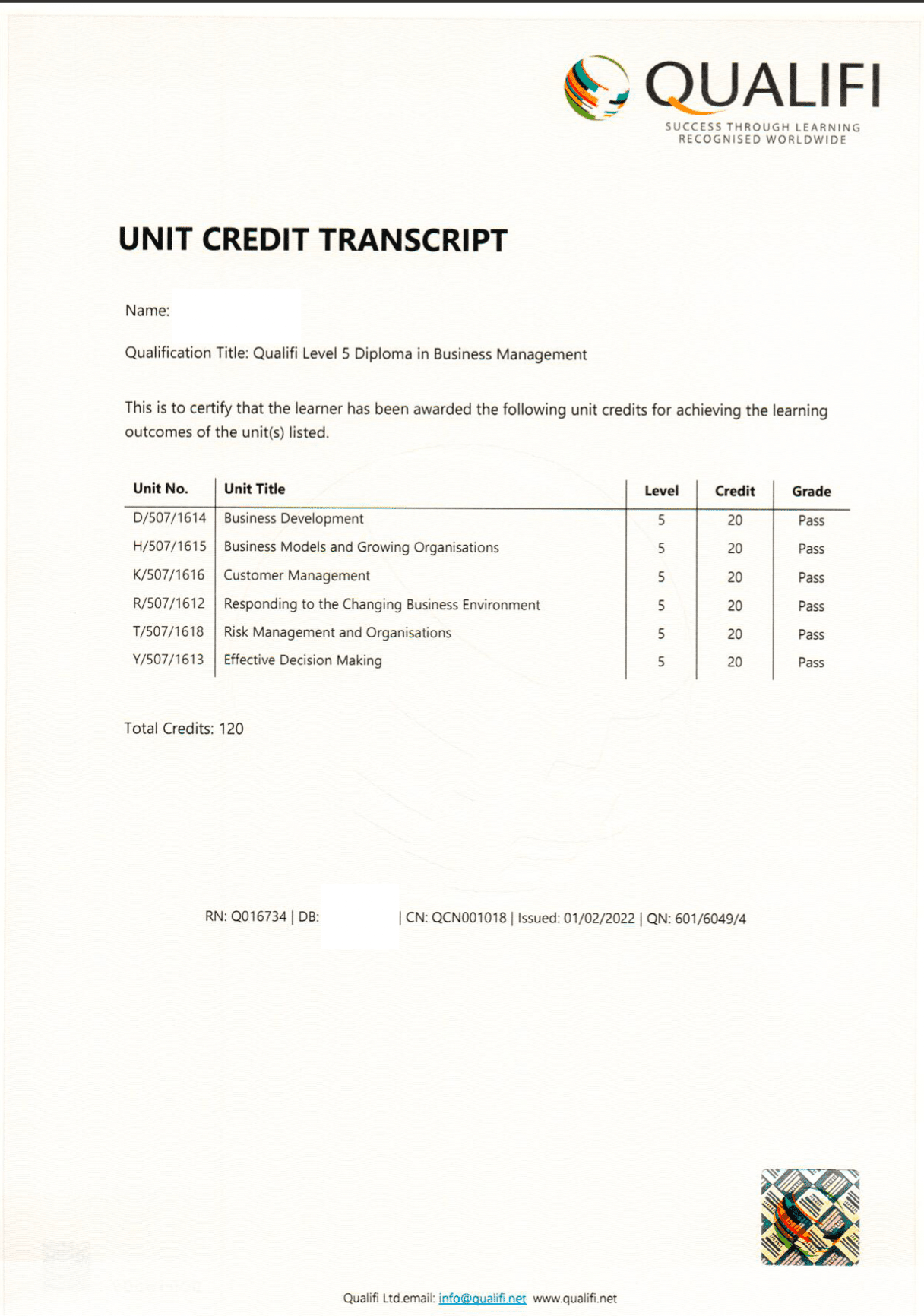Course name: Undergraduate – Level 4 & 5 Diploma In Human Resource Management
No. of units:
Non
Qualification:
Qualifi Level 5 Diploma In Business Management - 601/6049/4
Course option
£3,500 / £1,900 £1,900
Undergraduate – Level 4 & 5 Diploma In Human Resource Management
£1900 per level or £3500 for two levels together
About This Course
The level 4 diploma in human resource management and the level 5 diploma in business management are a 240 credit course designed to provide learners with the skills needed to succeed in management, focusing on human resources within medium to large businesses. These are valuable skills to have and can be used to open up opportunities at a huge variety of employers – from healthcare to hospitality, banking to broadcasting. This course can be your way of preparing for a career at any number of organisations.
The level 4 and 5 human resource management course is equivalent to the first two years of an undergraduate course, allowing learners to progress onto the final year of an undergraduate degree programme at a university.
This course is made up of 10 level 4 modules and 10 level 5 modules, each of which will be assessed by one multiple choice exam and written assignments (10 assignments at level 4 and 8 assignments at level 5). Our team of expert academics have designed a series of exclusive, comprehensive lessons for online study to help you study for these assessments. This material will cover everything you need to know and can be accessed anytime and anywhere.
Each module of the course consists of approximately 40 guided learning hours of material with an additional 30-50 hours of optional learning material. These materials are comprised of interactive exercises, further readings and internet resources.
Examples of University Progression

Awarding Body


Qualification
Qualification Numbers:TRCC Level 4 Diploma - Awaiting approval
Qualification Numbers 2:Qualifi Level 5 Diploma In Business Management - 601/6049/4

Course Details
The fee for enrolling onto the level 4 and level 5 courses together is £2600. Alternatively students can enrol onto a single level (level 4 or 5) for £1900 each.
Students can make payment using one of the following methods:
- Credit or debit card
- Bank transfer
- Interest free monthly instalments
- Paypal
- Western Union
- ELCAS funding
All course material, including online modules and written assignments
Personal tutor support with 1-2-1 Zoom sessions
Dedicated student support
Access to an online social learning forum
Assignment marking and feedback
FREE TOTUM student discount card
FREE laptop*
FREE access to Our Hubs
*excluding ELCAS funded learners
If you decide to top up to a full undergraduate degree through an accredited UK university, the costs are listed below.
University of Gloucestershire
BA (Hons) Business Management & Strategy – £3,250
Anglia Ruskin University
BA (Hons) Management – £4,850
Northampton University
BA (Hons) in Business and Management – £5,280
BSc (Hons) in International Accounting -£9,250
University of Derby
BSc (Hons) Business and Management– £5,200
Westcliff University
Business Administration – £11,655 (online) / £15,600 (on campus)
University of Hertfordshire
BA (Hons) Business Administration – £6,400
University of Central Lancashire (UCLAN)
BA (Hons) Business Management – £9,240
Edinburgh Napier University
BA in Business Management – £4,600
BA in Business and Enterprise – £4,600
BA in Sales Management – £4,600
University of Sunderland – On Campus
BA (Hons) Business and Management – £9,250
University of Bolton
BA (Hons) Top-up, fee £10,250
University of Cumbria
BA (Hons) Global Business Management – ON CAMPUS– £9,250 UK/ £13,250 International
BA (Hons) International Business Management – ON CAMPUS– £9,250 UK/ £13,250 International
University of Nicosia, Cyprus
Undergraduate Top up to BA – €6,000
NOTE: UK/EU students may be eligible for student loans for the top-up portion of their studies. Visit www.slc.co.uk for more information.
To enrol onto the level 4 course, you must be at least 18 and have a full secondary education. Before enrolling onto the level 5 course, you must have attained a level 4 or equivalent.
Culture and the organisation
Develop an understanding of what is meant by “organisational culture” and its various influences on the operation of the organisation itself.
Developing interpersonal skills
Come to understand the interpersonal skills that are required by managers and leaders in different managerial responsibilities. Learn how to develop these skills for improved performance.
Managing and rewarding performance
Learn what effective performance management means, and how it can be used to improve workplace performance, both in terms of discipline and reward.
Managing ethically
Develop an understanding of what ethical issues can arise as a part of effective management, how ethical decisions can be made, and what the legal and regulatory context of what workplace ethics looks like.
Managing people in organisations
Learn about the reasons for, and best methods of, training people in an organisation.
Motivating and influencing people
Learn the best methods for motivating people, both individually and as part of a team.
Organisation structures
Develop an understanding of the factors that shape the design of structure within organisations, and how the organisational structure can influence management strategy.
Recruitment and CPD
Develop an understanding of the internal approaches used to determine recruitment needs, and of the different approaches taken by organisations to attract and select potential candidates. Learn about the requirements of contracts of employment, and the importance of personal development.
Strategic human resource development
Learn about the importance of strategic HRM in an organisation. Develop knowledge concerning the analysis of various factors impacting the labour market, the ways in which employment can be terminated, and the different forms of discrimination.
Working in teams
Develop an understanding of the core principles that underpin an effective team, both in terms of team membership and team leadership.
The entrepreneurial manager
What is an Entrepreneur? Examine the skills and qualities of entrepreneurship.
Organisation structures
Why are organisations structured in the way they are? What determines the optimum structure and how does it differ between organisations? In this module, learners will look at the numerous models and theories that make up organisational structure.
Practical accounting analysis
Learners will complete exercises in accounts throughout this module to understand what they are telling us and the actions that analysis can precipitate.
Business planning and goal setting
What is the business trying to achieve? What will it do? How will it do it? This module focuses on the creation of clear goals and clear plans to achieve a clear objective.
Politics and business
Impact of politics on business and how it may help or hinder business. This module will educate learners on economic impact, exports and government support.
Business law
Explore the statutory responsibilities of managers as learners look into the legalities of business and business executives.
Managing in today’s world
Business in the modern world. This module focuses on governance and equality as a means to do right in business.
Performance management
Understanding how your people and your business can continually improve together, learners will review reward structures, CPD, training and development to ensure high performance in business.
Marketing and sales planning
Learners will analyse how markets, customers, competitors and products can come together in a cohesive plan.
Quantitative skills
On successful completion of this module, learners will have knowledge of numeric exercises and will understand their use within the context of the business.
The assignment unit titles for the level 4 course are:
- Strategic HRM
- Managing ethically
- Culture and the organisation
- Working in teams
- Organisational structure
- Recruitment and CPD
- Measuring and rewarding performance
- Managing people in organisations
- Interpersonal skills
- Motivating and influencing people
The assignment unit titles for the level 5 course are:
- Business development
- Business models and growing organisations
- Customer management
- Responding to the changing business environment
- Risk management and organisations
- Effective decision making
More information about the units can be found here https://qualifi.net/qualifi-level-5-diploma-in-business-management/
Successful completion of the undergraduate level 4 (diploma in human resource management) and level 5 (diploma in business management) and the final year of an accredited undergraduate degree programme, students will have attained the right credentials to go on and apply for a job in management, HR, strategic business management or business consultancy.
Choose your course option
Human Resource Management (Level 4&5)
-
University 1st year (Level 4) Full course materials and assignments
-
University 2nd year (Level 5) Full course materials and assignments
-
Unlimited tutor support
-
Recognised Of qualification
Diploma in Business Management (Level 5)
-
University 2nd year (Level 5) Full course materials and assignments
-
Unlimited tutor support
-
Recognised Of qualification
Human Resource Management (Level 4)
-
University 1st year (Level 4) Full course materials and assignments
-
Unlimited tutor support
-
Recognised Of qualification
Request a Course Prospectus
Related courses

Undergraduate Diploma in Information Technology – Level 5
No. of units: DIT401 to DIT510 Qualification: Level 5 Diploma in Information Technology – 603/4791/0 Course option £2,990 / £4,900 About This Course The rationale

University Undergraduate Level 5 Diploma in Cyber Security (year 2)
No. of units: DSC01 to DSC04 Qualification: Level 5 Diploma in Cyber Security – 603/4139/7 Course option £4,500/ £6,900 / £7,500 About This Course The

Undergraduate Level 4 Diploma in Cybersecurity
No. of units: CSEC02 to CSEC07 Qualification: Level 4 Diploma in Cyber Security (603/3331/5) Course option £4,500 / £5,900 / £7,500 About This Course QUALIFI








